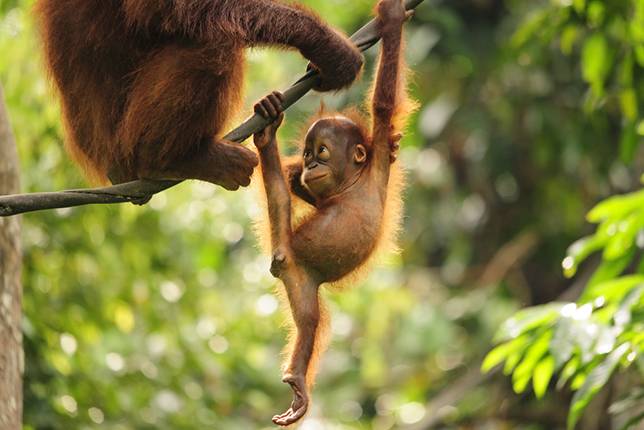Did you know that Sumatra is the only place in the world where tigers, elephants, rhinos, and orangutans coexist?
We are all very excited about our upcoming Sumatra Challenge in November.
Not only is this is a rare opportunity for us to witness first hand the devastation of palm oil plantations, but it's also an opportunity to celebrate and observe what's left of the incredible diversity of the Sumatran Rainforest. The disctinct wildlife is a major attraction of the Sumatran rainforest, especially the orangutan.
Orangutans are one of the most intelligent species on the planet.
They are among our closest relatives, sharing 97% of our DNA and can live to be up to 50 years old. Sumatra is one of only two islands where Orangutans can be found (the other being the island of Borneo in Malaysia) but the rapid deforestation is taking place on both islands is threatening the habitat of this amazing species.
Today, it is estimated that a mere 7,000 orangutans exists in the wild on the island of Sumatra. The species used to roam freely throughout the entire island but today they are restricted to a small area in the northern and western provinces of Sumatra. In fact, as a result of the destruction of the Sumatran rainforest, it is estimated that the population of the Sumatran orangutan decreased by 50% between the years of 1992 and 2000.

In the year 2012 alone, Indonesia lost 840,000 hectares of forest due to logging and palm oil harvesting.
Indonesia, where the Sumatran orangutan can be found, has the fastest rate of deforestation in the world.
The island of Sumatra itself has lost 75% of its original rainforest. At this rate, the Sumatran rainforest will practically disappear within the next 20 years and scientists predict that the orangutan population will cease to exist within a decade.
This would be an immeasurable loss for the planet because the biodiversity in the Sumatran rainforest is exceptional and losing it would result in the extinction of several undiscovered species of plants and animals.
The global impacts of deforestation are just as concerning.
Deforestation releases large volumes of climate warming gases into the atmosphere. This is particularly severe where deforestation occurs on peat soils.
Clearing and draining peat forests for agriculture such as palm oil expansion exposes stored carbon underneath the soil to the air and produces carbon dioxide. Thus, emitting huge amounts of carbon dioxide into the atmosphere.
According to WWF, up to 66% of all climate change emissions from oil palm plantations is estimated to come from the 17% of plantations established on peat soils.
While the statistics presented above are grim, they have inspired us to take action and bring awareness to the threats facing the Sumatran rainforest.
Want to learn even more?
1 Million Women is going on a jungle adventure to discover the majesty and mysticism of Sumatra's last remaining tropical rainforest and YOU can JOIN us!
Trek the jungle by day, camp under the stars at night & learn so much from the local women and environment. Highlights also include spending a day at the Sumatran Orangutan Conservation Programme, to learn how they are acting to prevent habitat loss.
Click the button below for more information.

